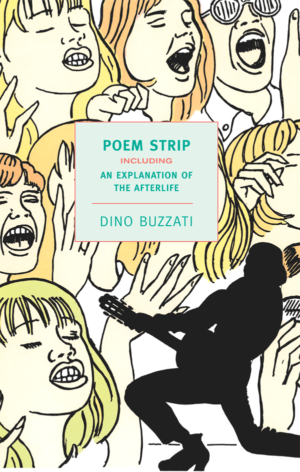 By DINO BUZZATI (New York Review Books; 1969/2009)
By DINO BUZZATI (New York Review Books; 1969/2009)
Here we have what in my view is one of the most vital publications of the early 00s, courtesy of NYRB Classics: the first-ever English translation of POEM STRIP, a graphic novel written and illustrated by the late Dino Buzzati. Originally published in Italian back in 1969, it showcases a side of Buzzati, who was renowned for the journalistic frankness of his prose, that isn’t widely known to the English-speaking world—a wild and untamed side with little use for conventional storytelling and a love of abstraction. Those penchants were previously showcased in NYRB’S 2004 translation of Buzzati’s children’s book THE BEARS’ FAMOUS INVASION OF SICILY, and reach their undoubted apotheosis in POEM STRIP—which, I should add, is not a children’s book in any way, shape or form!
It’s nominally about the famous singer Orfi and his search for his beloved Eura, who one day disappears into the wall of a mysterious mansion that turns out to be a portal to the underworld. In actuality, though, the book is a celebration of irrationality and discordance that constantly undercuts its mythologically informed narrative with visual and textual digressions.
Orfi’s song lyrics are given special attention, complete with illustrations depicting the sex-crazed witches, airborne devils dropping from clouds and Hell-spawned nymphs described in those songs. They punctuate a narrative that sees Orfi traversing a bizarre universe governed by an empty jacket that talks, and bordered by a sort of afterlife brothel filled with naked temptresses. Orfi eventually locates Eura, but also finds that bringing her back to the overworld will be far more arduous than anticipated.
Regarding Buzzati’s artwork, it has an untamed, primitivist sheen that put me in mind of Edward Gorey, albeit with a heavy erotic component that fits the narrative quite well. Salvador Dali, Fellini and NOSFERATU are explicitly referenced, with horror iconography (dark mansions, shadowy stairways, gnarled trees) and naked ladies (utilized in both literal and metaphoric fashion) being further constants. I won’t pretend to comprehend precisely what Dino Buzzati was up to here, but will report that he’s created a fascinating and erotic something that enchants and confounds in equal measure.
